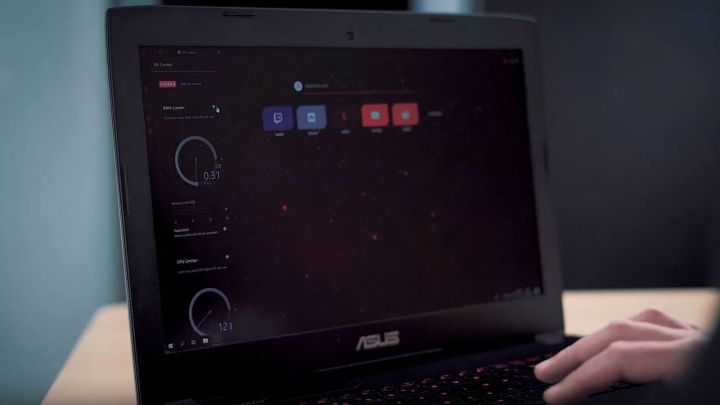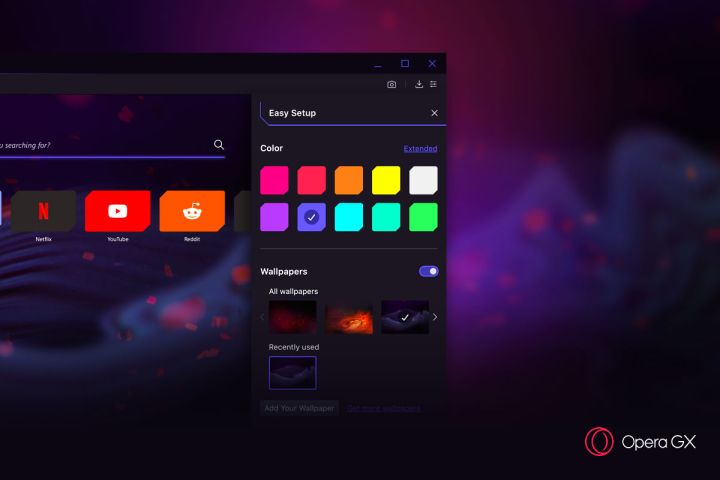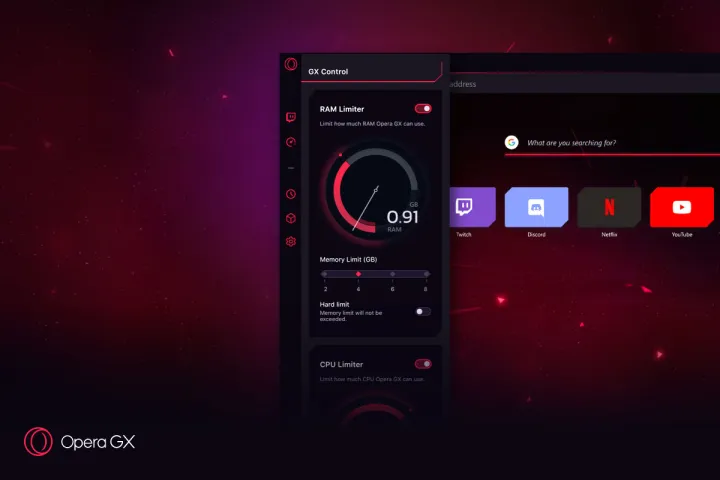
Opera is one of the better browsers out there, even if it might not be most people’s first choice. But the developers at Opera Software believe that gamers are one segment of the web-browsing population that might be interested in switching from their current browser (it’s probably Chrome) to something new and built entirely for them. Opera GX.
This new branch of the Opera browser isn’t decidedly different from the mainstream one it’s built on. It’s not a “gaming browser” in that will let you stream games using Google Stadia or something similar – although that is a door Opera is leaving firmly wedged open in case it becomes possible in the future. This is a browser for gamers, which means it not only looks and even sounds like the RGB peripherals most gaming systems come equipped with in 2019, but has some extra features designed with gamers in mind too.
It’s got the gamer look
“All browsers at the moment are meant to be general purpose tools. They should be as accessible, as fast, as beautiful, for anybody,” Opera’s product manager, Maciej Kocemba told Digital Trends. “If something is good for everybody, then sometimes you say it is good for nobody. If you want a hammer, it has to be a hammer and not also a screwdriver.”
That’s where the gamers within Opera’s developer team came up with the idea of a browser for gamers. What began as a joke project for that subset of the Opera team to enjoy among themselves became something far more real before long, and today, we have Opera GX to show for it.

The browser is immediately visually distinct from its contemporaries with a murky and brooding color palette that gives it the look and feel of gaming keyboards, mice, and laptops, which are far more dark and colorful than the beige computers of decades past. There’s an animated startup logo with a little auditory note like the logos before a game loads. Kocemba was happy to announce that Opera GX is the first browser to enjoy a fully animated boot logo too. The audio component of which, as well as a number of other interaction sounds within GX, were created in conjunction with sound designer Rubén Rincón and the band Berlinis. The artists have previously won awards for their work on the game Gris.
The dark theme mirrors both typical gamer style choices and the increasingly common “dark modes” offered by apps and websites for easier viewing late at night. It’s an intriguing difference to most browsers’ default themes. In our brief hands on time with the browser we quite enjoyed the change of pace, although the sound effects on icon interaction – reminiscent of console operating systems – did take some getting used to.
The home screen features the same speed dial icons as the standard Opera browser, with a slightly modified search bar; There’s a neat visual flare when you begin typing in it which fires a red bar across its base. The speed dial icons fade out to make reading search suggestions easier. Those icons also have their own new mouse-over animations which Kocemba particularly enjoyed.

All of this can be customized within the Easy Setup menu which is just a click away in the top-right corner. There you’ll find the ability to adjust colors and background wallpapers – a number of which are exclusive to Opera GX, for now — with a couple of clicks. There’s also the option to grab your desktop wallpaper without needing to find the original image on your system.
Razer fans are in luck because Opera GX ships out with Chroma integration, so any color theme changes you make within Opera GX not only adjust all manner of menu and icon colors within the browser, but on your connected Razer devices too.
Kocemba suggested that it was a “no brainer” to add additional peripheral support, so if this browser proves popular, expect peripherals and lighting systems from the likes of Logitech and Corsair to see support within future builds.
The left-hand toolbar from the standard Opera is also present in GX, although the in-browser apps like WhatsApp and Facebook messenger have been replaced with more gamer-orientated ones, like Twitch. You can sign in to that within the browser, and you’ll automatically receive push notifications when your favorite streamers start streaming.
Performance doesn’t change, unless you want it to
Opera GX is, under the hood, the same Opera browser of the main branch of development. It uses the same Chromium base and Blink rendering engine as the Chrome browser (among other things), so you can expect a lightweight experience to help games enjoy the full benefit of their system’s hardware. Opera has created a tool to make that possible, without having to redesign the browser from the ground up.
“[Opera GX] can be a little bit more polite to other applications and games,” Kocemba explained. “There are times when you don’t want to turn off your browser when playing a game […] The more resources you have for a game the better. Maybe you have Twitch, YouTube running, so what do you do then? We have provided a solution, and it’s called GX Control.”

GX Control is another menu within Opera GX which gives users the ability to customize what system resources it can consume and what it leaves for the rest of the system, and games, to utilize.
There’s a limiter on what percentage of your CPU’s cores (threads are not represented, so this has no impact on simultaneous multithreading or hyperthreading) can be used by the browser at any one time. It needs at least one core, but beyond that, you can make sure that your browser isn’t grabbing extra CPU cycles from your games or other software.
Kocemba did tell us that this feature will scale with the number of cores your CPU has. We found it to be limited to 25, 50, 75, and 100 percent options, with no more nuance on our six-core Ryzen 2600 CPU.
You can also limit memory usage, which is arguably the more important throttle. Modern web pages can chew through enormous sums of memory if given free reign, so Opera GX has a built in limiter with a soft and a hard edge to it. The soft one does its best to stay roughly within your set limit, however many gigabytes you decide is OK. The toggleable hard limit means any new tabs you open once you’ve hit that limit will start killing old ones.
Not the end of the world if your sole goal is to maintain performance outside of the browser, but it’s important to take note of if you have a half-filled form or YouTube video open in an older tab.
The control center also includes the option to manually control the volume of the browser itself, letting you reduce it as needed, or mute it entirely if you aren’t interested in hearing anything from it. That’s helpful whether it’s videos you have running, obnoxious autoplay adverts, or the auditory pings and ticks of Opera GX’s interface.
These are the games that Opera likes
An interesting additional tab on the Opera GX homescreen is GX Corner, which combines a deals aggregator with a list of new games, and news streams. While the latter is entirely independent and pulled from various gaming sites depending on your chosen nationality (you can decide which nationality of gaming and tech sites you want to hear from), the former two are curated by Opera.
The deals section features the latest sales from Steam, GoG, Humble Bundle, and others. All of those are highlighted by Opera staff and are based on what they consider to be good deals.

“50 percent off on a game that was two bucks and now it’s one buck, I wouldn’t really call that a deal,” Kocemba said, highlighting the kind of offers we can expect to see brought to our attention in that particular portion of the GX browser.
The What’s New section is also Opera curated and in our demonstration had everything from Beyond Good and Evil 2, to Heavy Rain, to Battle For Middle Earth II. These games are tagged with icons such as “puzzle,” “loved,” or “new,” as well as “old”, in the case of the aforementioned Lord of the Rings strategy game.
“There must be a reason for games to be in this section,” Kocemba told Digital Trends. “Sometimes it’s that we love it, this one is going to be a new version, this is an interesting puzzle game. We are giving a little tag or badge for why it’s there, so there’s a bit of an explanation.”
Although Kocemba did make it clear that Opera doesn’t make any money from this selection, it is something that could happen in the future. The focus would always be on the user, we’re told, but it is possible that if the feature proves popular, Opera could utilize affiliate links or similar to generate some revenue from game recommendations.
But that depends on gamers enjoying it. You can turn off those recommendations if you don’t, and Opera very much sees this as a trial run to see whether it will remain as part of GX or not.
It does make us wonder, with all of the gaming opinions and curated collections out there, many of which are present within storefronts like Steam and GoG already, will gamers really be interested in the opinions of nameless and faceless Opera developers? Only time will tell.
GX only dips its toe in the water
Our early impressions of Opera GX are mixed. It’s an interesting browser for sure and has some fun features which we look forward to playing around with more, but it’s hard to imagine it becoming a major component of gamers’ lives. Unless you’re an Opera user already, or someone who doesn’t use much in the way of extensions, you’re more than likely going to already enjoy a customized web browsing experience. Is it worth trying to port that experience over to a new browser for some RGB integration and throttling controls? We’re not sure just yet.
As much as the ability to cut back on your system’s browser resources with manual control could be useful, a faster CPU or more memory is a pretty easy way to ease that bottleneck. Opera’s method is certainly cheaper, but sacrificing what you love about your main browser seems like quite an ask for a pretty niche feature.
But it’s important to note that Opera GX is in “Early Access” at this time. This is very much a work in progress and one that Opera is keen to see what gamers think of it, before it pushes it too hard or cans it altogether.
If we don our skeptical caps for a second, it also seems an awfully big coincidence that Opera launched this “gaming” browser right around the time where there’s been a major push from Google — and more secretively, Microsoft and Sony — for browser-based game streaming. Opera GX is built on the same underlying system as Google’s Chrome browser, so we wouldn’t be surprised if Opera is hoping it could be an alternative to Chrome when Stadia debuts later this year.
That’s something that Kocemba said the door was always open for. We don’t blame him. It’s not necessarily something we’d recommend switching to GX for either – not until we can vet how useful Stadia is as a service on its own. But it’s a potential feather in GX’s future cap that could make a more viable alternative to more mainstream browsers.
For now, Opera GX is not much more than a fun experiment, and we really enjoyed the quick-access theme settings that it offers. There certainly is space in the browser market for something new, and hopefully Opera GX sets the foundation for more concepts in the future.



